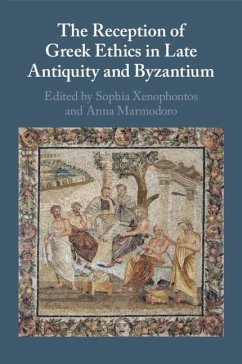The Reception of Greek Ethics in Late Antiquity and Byzantium
Herausgeber: Marmodoro, Anna; Xenophontos, Sophia
The Reception of Greek Ethics in Late Antiquity and Byzantium
Herausgeber: Marmodoro, Anna; Xenophontos, Sophia
- Broschiertes Buch
- Merkliste
- Auf die Merkliste
- Bewerten Bewerten
- Teilen
- Produkt teilen
- Produkterinnerung
- Produkterinnerung
This collection of new essays offers the first authoritative analysis of the reception of classical Greek ethics in Late Antiquity and Byzantium, and will interest scholars and students in the fields of philosophy, classics, patristic theology, social and cultural history of the medieval world, and the history of education.
Andere Kunden interessierten sich auch für
![The Reception of the Virgin in Byzantium The Reception of the Virgin in Byzantium]() The Reception of the Virgin in Byzantium63,99 €
The Reception of the Virgin in Byzantium63,99 €![Epicureanism and Scientific Debates. Antiquity and Late Reception Epicureanism and Scientific Debates. Antiquity and Late Reception]() Epicureanism and Scientific Debates. Antiquity and Late Reception103,99 €
Epicureanism and Scientific Debates. Antiquity and Late Reception103,99 €![Bodily Fluids in Antiquity Bodily Fluids in Antiquity]() Bodily Fluids in Antiquity42,99 €
Bodily Fluids in Antiquity42,99 €![Galen and the Arabic Reception of Plato's Timaeus Galen and the Arabic Reception of Plato's Timaeus]() Aileen R. Das (Ann Arbor University of Michigan)Galen and the Arabic Reception of Plato's Timaeus45,99 €
Aileen R. Das (Ann Arbor University of Michigan)Galen and the Arabic Reception of Plato's Timaeus45,99 €![The Philosophy of Argument and Audience Reception The Philosophy of Argument and Audience Reception]() Christopher W. Tindale (Ontario University of Windsor)The Philosophy of Argument and Audience Reception114,99 €
Christopher W. Tindale (Ontario University of Windsor)The Philosophy of Argument and Audience Reception114,99 €![Perceptions of the Body and Sacred Space in Late Antiquity and Byzantium Perceptions of the Body and Sacred Space in Late Antiquity and Byzantium]() Perceptions of the Body and Sacred Space in Late Antiquity and Byzantium51,99 €
Perceptions of the Body and Sacred Space in Late Antiquity and Byzantium51,99 €![The Routledge Handbook of Early Christian Philosophy The Routledge Handbook of Early Christian Philosophy]() The Routledge Handbook of Early Christian Philosophy226,99 €
The Routledge Handbook of Early Christian Philosophy226,99 €-
-
-
This collection of new essays offers the first authoritative analysis of the reception of classical Greek ethics in Late Antiquity and Byzantium, and will interest scholars and students in the fields of philosophy, classics, patristic theology, social and cultural history of the medieval world, and the history of education.
Hinweis: Dieser Artikel kann nur an eine deutsche Lieferadresse ausgeliefert werden.
Hinweis: Dieser Artikel kann nur an eine deutsche Lieferadresse ausgeliefert werden.
Produktdetails
- Produktdetails
- Verlag: Cambridge University Press
- Seitenzahl: 302
- Erscheinungstermin: 4. April 2024
- Englisch
- Abmessung: 229mm x 152mm x 17mm
- Gewicht: 436g
- ISBN-13: 9781108986595
- ISBN-10: 1108986595
- Artikelnr.: 70255626
- Herstellerkennzeichnung
- Libri GmbH
- Europaallee 1
- 36244 Bad Hersfeld
- gpsr@libri.de
- Verlag: Cambridge University Press
- Seitenzahl: 302
- Erscheinungstermin: 4. April 2024
- Englisch
- Abmessung: 229mm x 152mm x 17mm
- Gewicht: 436g
- ISBN-13: 9781108986595
- ISBN-10: 1108986595
- Artikelnr.: 70255626
- Herstellerkennzeichnung
- Libri GmbH
- Europaallee 1
- 36244 Bad Hersfeld
- gpsr@libri.de
Introduction Sophia Xenophontos and Anna Marmodoro; Part I. Ethics across
the Late Antique and Byzantine Period: 1. Sexual difference and the
difference it makes: the Greek Fathers and their sources David Bradshaw; 2.
Ethics and the hierarchy of virtues from Plotinus to Iamblichus Riccardo
Chiaradonna; 3. Neoplatonic contemplative ethics: mind training Sara
Ahbel-Rappe; 4. Ethics, virtue, and theurgy: on being a good person in
late-Neoplatonic philosophy John F. Finamore; 5. Imitation and
self-examination: the later Neoplatonists on the Platonic dialogue as moral
education through visualisation Robbert M. van den Berg; 6. The reception
of Greek ethics in Christian monastic writings Benjamin Blosser; 7.
Understanding self-determination and moral selfhood in the sources of
late-Antique and Byzantine Christian thought Demetrios Harper; 8. 'Singing
with David and contemplating Agesilaus': ethical training in Byzantium
Leonora Neville; Part II. Prominent Ethical Views of the Time: 9. The ethos
of a theologian: Gregory of Nazianzus and the reception of Classical ethics
Byron MacDougall; 10. Porphyry on justice towards animals: are animals
rational and does it matter for justice? Riin Sirkel; 11. Eustratius of
Nicaea and the Nicomachean Ethics in twelfth-century Constantinople:
literary criticism, patronage and the construction of the Byzantine
commentary tradition Michele Trizio; 12. Michael of Ephesus on the relation
of civic happiness to happiness in contemplation Péter Lautner; 13. George
Pachymeres' commentary on Aristotle's Nicomachean Ethics: a new witness to
philosophical instruction and moral didacticism in late Byzantium Sophia
Xenophontos.
the Late Antique and Byzantine Period: 1. Sexual difference and the
difference it makes: the Greek Fathers and their sources David Bradshaw; 2.
Ethics and the hierarchy of virtues from Plotinus to Iamblichus Riccardo
Chiaradonna; 3. Neoplatonic contemplative ethics: mind training Sara
Ahbel-Rappe; 4. Ethics, virtue, and theurgy: on being a good person in
late-Neoplatonic philosophy John F. Finamore; 5. Imitation and
self-examination: the later Neoplatonists on the Platonic dialogue as moral
education through visualisation Robbert M. van den Berg; 6. The reception
of Greek ethics in Christian monastic writings Benjamin Blosser; 7.
Understanding self-determination and moral selfhood in the sources of
late-Antique and Byzantine Christian thought Demetrios Harper; 8. 'Singing
with David and contemplating Agesilaus': ethical training in Byzantium
Leonora Neville; Part II. Prominent Ethical Views of the Time: 9. The ethos
of a theologian: Gregory of Nazianzus and the reception of Classical ethics
Byron MacDougall; 10. Porphyry on justice towards animals: are animals
rational and does it matter for justice? Riin Sirkel; 11. Eustratius of
Nicaea and the Nicomachean Ethics in twelfth-century Constantinople:
literary criticism, patronage and the construction of the Byzantine
commentary tradition Michele Trizio; 12. Michael of Ephesus on the relation
of civic happiness to happiness in contemplation Péter Lautner; 13. George
Pachymeres' commentary on Aristotle's Nicomachean Ethics: a new witness to
philosophical instruction and moral didacticism in late Byzantium Sophia
Xenophontos.
Introduction Sophia Xenophontos and Anna Marmodoro; Part I. Ethics across
the Late Antique and Byzantine Period: 1. Sexual difference and the
difference it makes: the Greek Fathers and their sources David Bradshaw; 2.
Ethics and the hierarchy of virtues from Plotinus to Iamblichus Riccardo
Chiaradonna; 3. Neoplatonic contemplative ethics: mind training Sara
Ahbel-Rappe; 4. Ethics, virtue, and theurgy: on being a good person in
late-Neoplatonic philosophy John F. Finamore; 5. Imitation and
self-examination: the later Neoplatonists on the Platonic dialogue as moral
education through visualisation Robbert M. van den Berg; 6. The reception
of Greek ethics in Christian monastic writings Benjamin Blosser; 7.
Understanding self-determination and moral selfhood in the sources of
late-Antique and Byzantine Christian thought Demetrios Harper; 8. 'Singing
with David and contemplating Agesilaus': ethical training in Byzantium
Leonora Neville; Part II. Prominent Ethical Views of the Time: 9. The ethos
of a theologian: Gregory of Nazianzus and the reception of Classical ethics
Byron MacDougall; 10. Porphyry on justice towards animals: are animals
rational and does it matter for justice? Riin Sirkel; 11. Eustratius of
Nicaea and the Nicomachean Ethics in twelfth-century Constantinople:
literary criticism, patronage and the construction of the Byzantine
commentary tradition Michele Trizio; 12. Michael of Ephesus on the relation
of civic happiness to happiness in contemplation Péter Lautner; 13. George
Pachymeres' commentary on Aristotle's Nicomachean Ethics: a new witness to
philosophical instruction and moral didacticism in late Byzantium Sophia
Xenophontos.
the Late Antique and Byzantine Period: 1. Sexual difference and the
difference it makes: the Greek Fathers and their sources David Bradshaw; 2.
Ethics and the hierarchy of virtues from Plotinus to Iamblichus Riccardo
Chiaradonna; 3. Neoplatonic contemplative ethics: mind training Sara
Ahbel-Rappe; 4. Ethics, virtue, and theurgy: on being a good person in
late-Neoplatonic philosophy John F. Finamore; 5. Imitation and
self-examination: the later Neoplatonists on the Platonic dialogue as moral
education through visualisation Robbert M. van den Berg; 6. The reception
of Greek ethics in Christian monastic writings Benjamin Blosser; 7.
Understanding self-determination and moral selfhood in the sources of
late-Antique and Byzantine Christian thought Demetrios Harper; 8. 'Singing
with David and contemplating Agesilaus': ethical training in Byzantium
Leonora Neville; Part II. Prominent Ethical Views of the Time: 9. The ethos
of a theologian: Gregory of Nazianzus and the reception of Classical ethics
Byron MacDougall; 10. Porphyry on justice towards animals: are animals
rational and does it matter for justice? Riin Sirkel; 11. Eustratius of
Nicaea and the Nicomachean Ethics in twelfth-century Constantinople:
literary criticism, patronage and the construction of the Byzantine
commentary tradition Michele Trizio; 12. Michael of Ephesus on the relation
of civic happiness to happiness in contemplation Péter Lautner; 13. George
Pachymeres' commentary on Aristotle's Nicomachean Ethics: a new witness to
philosophical instruction and moral didacticism in late Byzantium Sophia
Xenophontos.








